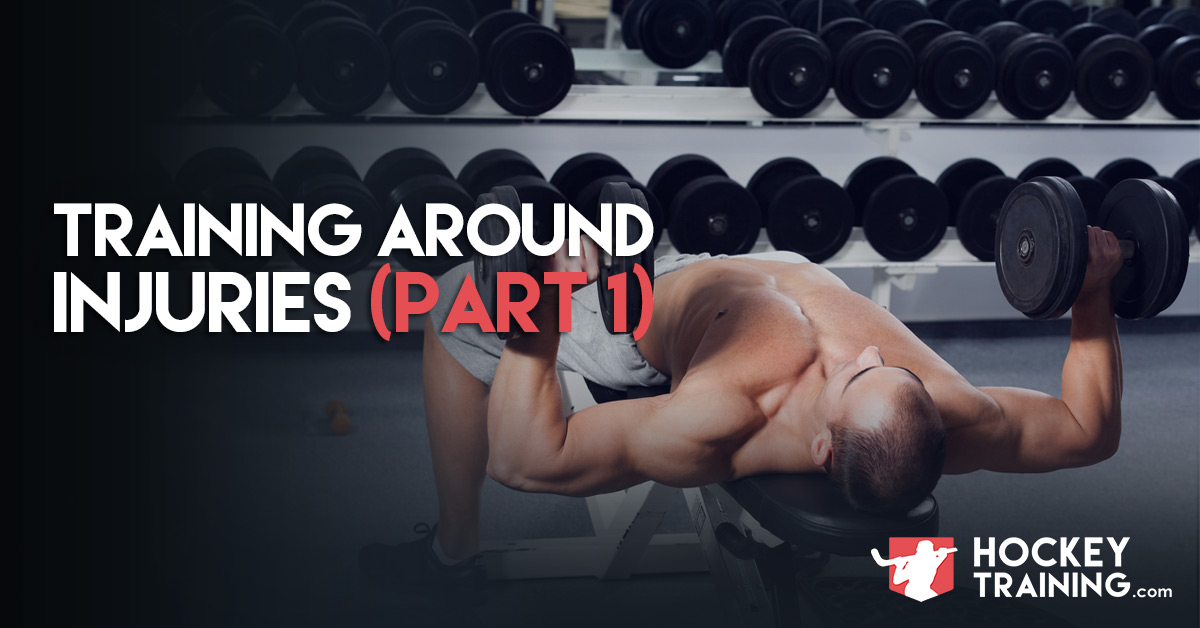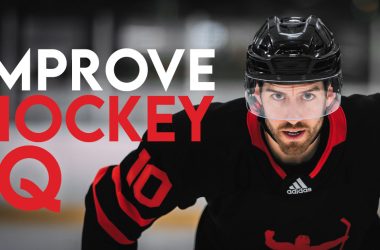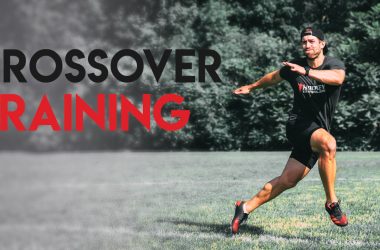A lot of guys freak out when they need to take some time off, expecting unstoppable decreases in strength and muscle mass. The fact of the matter is that your body will not let go of muscle mass or strength training adaptations that easily, unless of course you let it with either bad habits or poor planning.
For the average hockey player, there is typically three main reasons why time off is taken from the gym:
1. Vacation
2. Planned deload
3. Unplanned deload due to injury or psychological stress
Vacation
During a vacation is a time for hard working athletes to let go and relax. You train very hard 4-6 days a week and consistently adhere to sound nutritional habits. Vacations are the time where you can unwind, let go of any stress that has been building up inside and build up some new hunger for the gym that may have been down a bit due to training hard for long periods of time.
If it’s a 1-2 week vacation, the only thing I would advise you to do is make sure you’re hitting your protein target every day. That is, you should always be staying around 1g of protein per pound of body weight taken in every day. Beyond this, just do what you want to do. I personally don’t eat a bunch of crap on a vacation simply because getting sloppy actually makes me feel like shit and I can’t enjoy the vacation as much as I otherwise could have due to being more tired, having less energy and feeling bloated. I normally have a treat here and there, make sure I hit my protein target and then just relax from there on out.
These experiences are meant to be inhaled, not shunned. Don’t be that guy who brought chicken and broccoli to the buffet in Vegas, you’ll look back on it and realize how small of an impact one meal has on your life and wish you could have enjoyed yourself more with your friends.
Having said this, these rules are meant for people who do actually train hard and adhere to sound nutritional programming throughout the year. If you’re eating out often and not making progress in the gym, then I don’t really know what to tell you. That sounds like you’re always on vacation.
When all is said and done, you will not lose muscle or strength from taking a week’s vacation and it can in fact do you some good by reducing stress and re-igniting your hunger for hard training.
Planned Deload
“Going by feel” in the gym is not the best strategy.
The principle of overload is essentially performing a task within a given threshold to create a stimulus of adaptation. This task must be in some way, shape or form be a more difficult task than your body has been exposed to in the past or else it will not present an overload to the muscle or systems involved that you are trying to change.
The types of overload of course can come in many different forms as there are many different physical qualities that require a specific stimulus to create positive adaptation. For example, power, strength, hypertrophy, endurance and all of the sub categories that go into these qualities have varying volumes, intensities, intramuscular tension, mechanical tension, force production and metabolic stress to train them individually with maximum efficiency.
An easy example of overload would be if you bench 300lbs x 8 this week and come in the following week and perform 305lbs x 8. You have technically created an overload on your body which would then create a stimulus in the body to adapt accordingly, in this case build more lean muscle tissue and strength. You have to do better than your previous efforts in some way in order to force progress.
Overload creates the stimulus, fatigue management solidifies the result. In the case of this blog post:
Overload in the gym creates the stimulus for strength and muscle mass, deloads allow you the time to recover and actually gain your newfound strength and muscle. This is what recovery is all about.
Now here’s the thing and why I first broke down overload before getting to the “going by feel” stuff. Overload is undeniably one of the largest contributors to any training program’s success, but it also comes at a cost. That cost is not being comfortable and gradually accumulating more and more fatigue.
When you are “going by feel”, how many times are you really going to squat heavy and go all out for a set you have never done before? Never!
Squatting respectable weight through a respectable range of motion (none of this half squat crap that guys pretend they don’t do) is bone crushing and brutal. The “going by feel” crowd more often than not gravitates (whether they admit to themselves or not) to what they enjoy and what they can repeat on a weekly basis. Half squats and curls in the squat rack it is!
If you’re training program is not creating accumulated fatigue over a time period of 3-6 weeks to the point where you need to deload, you’re not placing an adequate overload stimulus and without proper overload you’re never going to make progress. A better way to approach program design is to systemically incorporate both overload and deloading to create maximum changes in the shortest possible time period.
“I don’t need to deload man. I always feel good, I love training too much to deload.”
Well then you’re probably both not training hard enough and going by feel too often. If you never need to deload, I can safely predict you are in one (or more) of these categories:
1) Small
2) Hit a plateau in development
3) Don’t actually train hard
4) All of the above
Planning deloads into your training periodization is an absolute must during the offseason due to the primarily goals and accompanying intensity required for those goals. In-season work on the other hand, you can get away without deloading if you program accordingly and plan your tapering and peaking cycle correctly.
Getting back to the main thrust of this post and offering suggestions behind maintaining your strength and muscle mass during your time off. If you have been reading attentively, you will now understand that during a planned deload you are actually GAINING lean muscle and strength.
Fatigue during a training block masks newfound strength and muscle mass.
Deloads reveal it.
Once your body has adapted to the supercompensation curve you have placed on it by training your ass off in this past training block, you will be coming back to the gym a new man. Proper deloading increases testosterone levels, brings nervous system functional back to optimal (this takes 3-4 days), lowers cortisol, supercompensates glycogen storage and heals nagging injuries.
Only real guidelines for deloading are:
• You should be eating at maintenance calories. This maximizes recovery and minimizes fat storage during inactivity
• Most athletes should never need longer than a 5-7 day deload
• Don’t even train during this time
• Hit your protein target everyday
• Don’t drink a ton of alcohol and do other dumb things
Unplanned Deload
Life happens.
Sometimes things can happen that get in the way of doing the things that we love to do. Whether it’s a loved one dying, taking a puck in the grill, breaking your arm, illness, having a newborn baby in your family or any other scenario you can think of. Injuries and/or psychological stress can get us out of our routine and cause some unplanned time off.
Here’s the gist of a scenario like this and some of the implications:
• You’re not going to lose any muscle or strength if you take a week off
• After 3 weeks, you might lose some strength although this is highly nervous system based and not structurally (muscle) based
• After 3 weeks of inactivity, you could begin to lose some actual muscle tissue. But you can limit the severity of this by doing some easy things
Experience and research has taught me that the more experienced you are, the greater your ability to hold on to your current level of strength and muscle mass during a layoff. Meaning, if you’ve been hitting the weights for 10 years and have built a respectable foundation of muscle mass and strength, your gains will stay with you a lot longer than a guy who has only been training one year.
Gains made quickly are also lost quickly.
This is one of the major reasons you see dumbasses take anabolic steroids to “get jacked” but their training programs are stupid and their diet is even worse, so they slightly bloat up a bit when they are on a cycle and then very shortly after they lose everything they tried to get while simultaneously taking a knock at their health. Don’t be one of these idiots.
But I digress.
A couple more things of important note here that I think should be mentioned in the realm of physical losses is that the more experienced you are, even if you lose some muscle and strength it will come back sooner than if you were to start over again. The general public typically calls this “muscle memory”, it’s a complicated topic but the idea is just essentially that. Those who have been there before, can get back there easier than someone who has never been there before.
Another thing is that the more neural your training is, is faster you will lose your strength. Meaning, if you’re always training power movements in the 1-3 rep range, this will leave you MUCH quicker than strength or muscle mass will.
“So, what can I do to limit any muscle or strength loss?”
A big problem guys have in this unplanned deload department is they let go of what they were doing when they were trying to get strong. In other words, they let their mind out of the game as well as their body.
They stop eating protein.
They start eating junk.
They stop taking their supplementation.
They start drinking more with the excuse being that they aren’t training anyways.
They don’t pay attention to their water intake.
They don’t find out what they can do, and instead, just do nothing.
What’s the point of doing all this stuff right? This was all to support my training, I’m not training anymore!
Well, if this is how you behave you will lose your hard fought gains in strength and muscle mass much faster than if you were to be smarter. The things that help you gain muscle and get leaner while you train are the same things that help you maintain your current level of fitness while you’re not training.
Keep doing all the good things!
Actually, if anything, this gives you a reason to be even more strict and diligent about your sleep and nutrition. Who wants to lose their gains? Don’t you want to do anything you can to maintain what you have?
Here are some takeaway suggestions that you can use to minimize an already bad situation during an unplanned deload:
• Take any opportunity that you can to train. Even if it’s once a week, twice a week, 20mins, or even body weight only. Anything is better than nothing and you would be surprised at how much easier it is to maintain muscle than it is to gain it. Preserving your muscle is worth the effort.
• If you’re injured, don’t be a baby about it. Focus on what you can do instead of what you can’t do in the gym. If it’s a lower body injury, still do some upper body movements. If it’s an upper body injury, increase your lower body training frequency.
• Don’t be a fatty. If you’re not training, you’re not going to need as many calories. Eat healthy and adjust accordingly.
• Hit your protein target every day.
• Stay on your supplements.
• Remain intellectually stimulated on your training and your sport. Read up on different training strategies, nutrition strategies, supplements, on-ice strategy, etc etc. Anything at all here, stay in the game!
Want to become a better hockey player? Check out our Hockey Training Programs that will help you score more goals – guaranteed!









